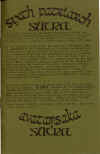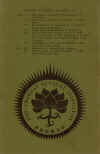The Venerable
An Shih Kao
Rescues
The God-Snake
of Hu T'ing
Lake
"An Account of a Miraculous Conversion"
—from
the lectures of Tripitaka
Master Hsuan Hua
From
causes made in lives gone by
Comes your present life;
Results you'll get in lives to come
Are born from what you do right now.
Living beings on the six-path wheel of rebirth cannot avoid cause and effect. If you are wealthy now, it is because you were generous in previous lives; if you are poor, it is because you were stingy. To know what your future lives will be like, look at what you are doing now. If you foster merit and practice giving now, you will certainly be wealthy; if you do not, you certainly will be poor. You do not need spiritual powers, the heavenly-eye or the knowledge of past lives to understand this principle.
The High and Venerable Bhiksu An Shih Kao also named An Ch'ing, was
born the son of the King and Queen of An Hsi Country (i.e. Parthia), a
small kingdom near India. From birth he was (extraordinarily intelligent
and mastered medicine, divination, astrology, and physiognomy when he was
still young. He not only studied the sciences of man, but also learned the
languages of animals and birds. When wild animals spoke, he knew what they
said, and when the birds had a conversation, he understood.
One day, while on a holiday with many friends, he heard a swallow
say to its flock, "Someone will send us food today!" An Shih Kao
told his companions what the swallow had said, but they refused to
believe. In a short while, someone came with provisions for the birds, and
everyone thought it was very strange that he could understand the language
of birds. Confucius' disciple Kung Ye Ch'ang also had this ability.
An Shih Kao studied thoroughly and well, and when his father died, he became Emperor. All the officials brought their problems to him. If it wasn't this problem, it was that problem: "This is too much trouble!" he finally said, and abdicated the throne, which fell to his uncle. He had never married, and as a Buddhist layman he had held the pure precepts. Now he left home to become a Bhiksu.
A friend of his, a very intelligent Bhiksu, had, like An Shih Kao,
learned Buddhadharma quickly. What he once heard, he never forgot. But
this Bhiksu had a temper; he would do good deeds and then, without knowing
why, he would suddenly lose his temper, fly into a rage and shout, “I
don’t want your offerings!”
An Shih Kao said to him, “Friend, your wisdom is equal to mine, but your hatred is much greater. I fear that in the future you will fall. If I do not certify to the fruit (of Arhatship), I won’t be able to help you, but if I have the Way, I shall find you and take you across. Now, I am going to Canton, China, to receive from a former life.”
In Canton during the reign of Emperor Huan of the Eastern Han dynasty (147-168 A.D.), the government was in disorder and many bandits roamed the streets. Upon his arrival, An Shih Kao passed by a young man who immediately took out a knife and said, “Now that I have met you, I am going to kill you.”
“Go right ahead, kill me,” An Shih Kao replied, “but may I ask you why you hate me so?”
The young man was puzzled. “I really don’t know,” he said, “but I wanted to kill you the moment I saw you. I feel that you are evil.”
An
Shih Kao said, "You don't know why you want to kill me, but I do.
It is because in a previous lifetime I killed you. I have come here
today only because I want you to kill me." Then he stretched out his
neck and asked the man to kill him. His face didn't show the slightest
trace of fear, just like the Fourth Patriarch, Hui K'o, who bared his neck
for the executioner (see V.B.S. #4, 1970). The boy cut off An Shih
Kao's head and An Shih Kao died. Everyone exclaimed, "This person did
not fear death. He said that because he killed you before, you had to kill
him now. This is very strange."
The crowd dispersed and the soul of An Shih Kao returned to An Hsi Country to be reborn as the King's son once again. When he was sixteen, he again left home to become a monk, and immediately went to China to save his former friend and his former murderer. He found his former murderer in Canton, no longer young but middle-aged.
An Shih Kao asked him, "Do you remember that on such and such a day you killed a Bhiksu?"
The man said, "Yes, I remember. Have you come to take revenge?”
“No, I have not come to take revenge. I am the person you killed. I was reborn in An Hsi Country and now I have come back to China to tell you of the cause and effect. You kill me; I kill you—there is no end to this. But don’t be afraid, I won’t kill you.”
The man thought to himself, "It has been many years since I killed that man, and this monk is a foreigner. But he must be telling the truth; how else could he know these things?"
An Shih Kao said, "I have told you the cause and effect. Now, I must go to save my old friend from my past life."
"Where
is your friend," said the man.
"In
Chiang Hsi."
"Good,
I'll go with you."
So they went together to Lu Mountain in Chiang His with a party of over thirty people. At Lu Mountain, by the shore of Hu T'ing Lake, there was a temple with an extremely magical god (shen) living inside. If travelers lit incense and bowed to the god, their boats would travel safely across the waters, but if they did not, big waves would capsize their boats. Once a businessman asked the god if he could take the bamboo that grew within the temple. The god didn't reply, so the businessman grabbed the bamboo and ran. His boat swamped and he was drowned, and the bamboo floated right back to the temple. The people said, "He is truly god, truly god!' and for a thousand miles around, everyone knew that god lived in Hu T'ing Temple.
When
An Shih Kao's party arrived at the lake, those who believed in the god
went to bow to him while An, Shih Kao stayed in the boat. The god said,
"There is a Sramena on your boat. Invite him here I" When they
told An Shih Kao, he said, "It is just this god whom I have come to
take across."
"Friend," he said to the god, "you still have that big temper, don't you? When someone slights you, you capsize his boat. You have killed many people."
The
god said, "I don't know what to do! I have to exist as a god who
manages an area of about 1000 miles, but when I die I shall certainly go
to hell for the crimes I have committed."
"Don't worry," said An Shih Kao, "last life you were my friend and I have come to help you. Knowing your errors and having met me--reveal your original form!"
“I can’t!” said the god. “Everyone would die of fright.”
The god had been hiding behind the bed. Slowly his head rose up, the head of a big snake—a Mahoraga who could eat five people in one gulp. An Shih Kao explained the Dharma to the snake and recited mantras for him. The big snake cried; tears fell like rain. He said, "Soon I shall die, but I won't leave this ugly corpse here. I am going to a big marsh in Shan His to die."
An Shih Kao returned to the boat and as it cast off from the dock, the Mahoraga appeared in the sky above the mountain tops and bowed to An Shih Kao. Everyone waved goodbye to him. That was the end of the Mahoraga.
Later on their voyage a young boy appeared on the boat and bowed to An Shih Kao. He listened carefully while An Shih Kao explained the Dharma to him, and then he disappeared. An Shih Kao told his followers, "This boy was the former Hu T'ing Lake Temple God; he returned to thank me."
From that day on, no matter what anyone prayed for at the Hu T'ing Lake Temple, there was no response. What is more, in Shan Hsi in a big marsh, the enormous body of a snake, measuring several miles long, appeared. The village there is now called "Snake Village". Soon everyone knew about this incident and many more people came to believe in the Buddhadharma.
When they disembarked. An Shih Kao handed his former murderer a box, saying, "I have to go to Hui Chi to receive more retribution. In four years open this box and see what is inside. If anything should happen to me, please see that I am buried properly. "
As he passed through Hui Chi, he walked behind two men fighting in the street. One of them raised a club to strike his opponent, cracked open An Shih Kao's head on the back-swing and killed him.
Four years later, the box was opened and in it were these words, "Ch'en Hui venerates me, and Monk Hui guards my Ch'an Dharma."
An
Shih Kao insisted, “Impossible. They won’t be afraid. Now appear and
let me see you.”
At that time no one understood these words, but later a laymen
named Ch’en Hui venerated An Shih Kao, and a Dharma Master named Monk
Hui propagated the Sutras An Shih Kao had translated.
An Shih Kao dwelt in China for twenty years. Although a foreigner,
he learned Chinese quickly and translated over thirty Sutras with great
accuracy.
That
An Shih Kao, a monk of such high virtue, had to undergo a severe
retribution such as this should warn us not to look lightly on cause and
effect and casually lose our tempers. The Hu T'ing god-snake had been a
Bhiksu in his last life, but fell to rebirth as a snake because he liked
to get angry. Everyone thought he was magical. Who would have guessed that
he was such a weird thing? Had it not been for An Shih Kao's vow to save
him, he would have been in serious trouble.
An
Shih Kao was extremely filial to his father and mother. Later, when he
went to China everyone recognized him as a high monk of great virtue.
Because his father had been king, the people called him Lord An.
translated by Disciple Bhiksuni Heng Yin
“Slowly
his head rose up, the head of a big snake...”


